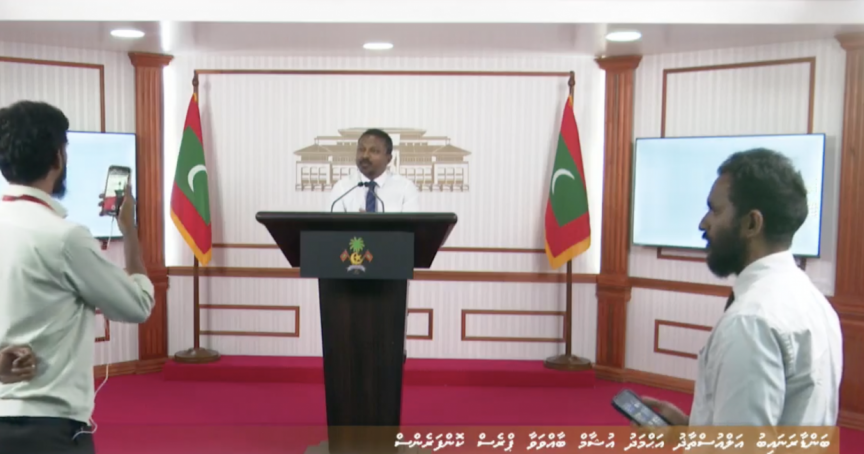
Attorney General Ahmed Usham (R) with President Dr. Mohamed Muizzu (L). (Photo/President's Office)
The Attorney General (AG) on Wednesday said he will make public the AG Office's proposed amendments to the controversial bill designed to grant the government control over media outlets.
The announcement came amidst escalating tensions and protests from the journalistic community.
Earlier on Wednesday, a meeting of the Independent Institutions Committee, convened to review the media bill introduced by government-affiliated Thulhaadhoo Constituency Independent Member Abdul Hannan Abubakar, was held in secret. Journalists who refused to leave and demanded an explanation for the closed-door session were reportedly physically removed from the committee meeting room by parliamentary security.
Following the incident, journalists gathered near the President’s Office in protest. AG Usham met with the protesting reporters and provided assurances that the AG Office’s proposed amendments to the media bill would be made public. However, he offered no further details.
Previously, at a press conference regarding the bill, Usham had maintained that he did not believe the bill should be withdrawn, a key demand of the protesting media. He had also stated that a draft bill sent to the AG’s Office in August 2022 by the Media Council bore "not too much of a difference" from the current bill accepted in parliament.

On that day, August 28, journalists collectively boycotted the AG’s press conference and left the President’s Office, after accusing him of misleading them.
Concerns regarding the bill have been widely expressed by Maldivian journalists, international journalists' associations, and the HRCM, all of whom assert that the bill contains provisions that are antithetical to democratic principles and regulations. Despite the government's insistence that it is not directly involved, ruling party (PNC) MPs have publicly defended the bill in parliament.
While government members and officials argue that the bill, which empowers the president to control the media, is crucial for curbing the spread of misinformation, advocates for journalism and independent media contend that its true purpose is to prevent news agencies from reporting on alleged thefts and corruption involving politicians.
Establishment of a Maldives Media and Broadcasting Commission. This new commission would oversee media operations.
Three members would be appointed by the President, with the remaining four elected by the media.
The President would appoint the commission's head.
A fine of MVR 5,000 to MVR 25,000 would be imposed for failure to rectify issues as per the commission’s order.
Media outlets could face fines up to MVR 100,000 for actions deemed illegal or against amended laws.
The commission would have the power to temporarily cancel a media outlet's registration upon commencing an investigation.
The commission could annul a registered media outlet before court proceedings are concluded.
The commission would have the authority to block news websites, tabloid channels, and stop TV broadcasts.
The commission could bring back cases from up to a year before its establishment and take action on them.
Addressing the unrest surrounding this bill, the President has stated he has no interest in controlling the media and has asked PNC members to pass the bill without giving him any powers, as the bill currently implies.